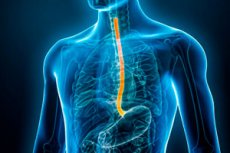Unraveling the link between the microbiome and esophageal cancer
最近審查:14.06.2024

Esophageal cancer (OC) is an aggressive malignancy with a poor prognosis, the development and progression of which is potentially influenced by changes in the esophageal microbiome. Recent studies have shown that certain microbiome compositions may be associated with the development of RP, response to treatment and patient prognosis.
Esophageal cancer has two main subtypes: esophageal squamous cell carcinoma (ESC) and esophageal adenocarcinoma (EA). These subtypes differ significantly in geographic distribution, risk factors, and clinical characteristics. Despite significant efforts, RP remains difficult to diagnose and treat due to frequent late detection and resistance to conservative therapies.
Extensive review conducted by researchers at Zhengzhou University, Henan Provincial Cancer Hospital and Marshall Medical Research Center represents a significant advance in oncology. Published in the journal Cancer Biology and Medicine, the review highlights significant findings regarding changes in the esophageal microbiome in RP and their impact on the pathogenesis and prognosis of the disease.
It identifies key shifts in the microbiome associated with RP and explores how these changes may impact patient outcomes.
Researchers have found that specific changes in bacteria are associated with different stages of RP. For example, lactic acid-producing bacteria were more common in AP, indicating that these microbes may support tumor survival by converting glucose into lactic acid, providing energy to malignant cells.
They also noted a decrease in microbial diversity in PRP compared with non-tumorous tissues. This decrease in diversity was associated with increased levels of Fusobacterium and decreased levels of Streptococcus, indicating that certain microbial profiles may play a role in cancer progression.
The study also examined how microbiome dysbiosis may influence treatment outcomes. Distinct microbial compositions have been associated with different responses to radiation and chemotherapy, highlighting the potential of the esophagus to influence treatment efficacy.
"Understanding the role of the esophageal microbiome in the development and progression of RP may lead to earlier detection and personalized treatment approaches," said Dr. Hongle Li, one of the study authors. "Our results indicate that microbiome dysbiosis may not only contribute to the pathogenesis of RP, but also influence treatment outcomes."
The study has important implications for early detection and improved treatment strategies for RP. Identifying microbial markers associated with disease progression may pave the way for targeted therapies that disrupt cancer-forming bacteria. Moreover, specific microbial profiles can serve as prognostic indicators to aid treatment planning and patient monitoring.

